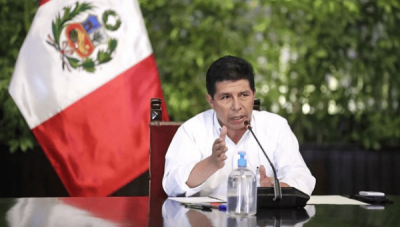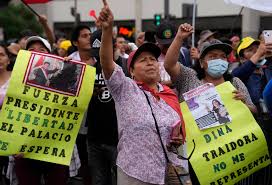Unrest Spreads Across Peru After Massacre of Civilians
Calls for the prosecution of coup-President Dina Boluarte while unprovoked killings of dozens in the south of the South American state continues

All Global Research articles can be read in 51 languages by activating the Translate Website button below the author’s name.
To receive Global Research’s Daily Newsletter (selected articles), click here.
Follow us on Instagram and Twitter and subscribe to our Telegram Channel. Feel free to repost and share widely Global Research articles.
***
Since the ouster by the parliament of former leftwing President Pedro Castillo in December, demonstrations demanding his release from detention and the reversal of the military-backed coup have been unrelenting.
Official figures indicate that over the last month some 48 people have died as President Dina Boluarte has attempted to end protests which are seeking her resignation, the immediate release of Castillo and the holding another round of elections.
The impeachment of Castillo was done in a perfunctory manner absent of any substantiative hearings where evidence of alleged crimes could have been presented. A split from the Peru Libre party on whose slate Castillo and Boluarte ran in 2021 encouraged the rightist elements along with the military to take effective power.
Despite the departure of Castillo and Boluarte from Peru Libre, the president maintained widespread support by the electorate concerned about the reforms under which he campaigned during 2021. Castillo retains tremendous support in the southern region of the country among the rural population groups. This region is key to the overall economy of Peru which is heavily dependent upon tourism and the extractive industries.
Castillo, an educator and trade union leader based in the rural areas of the South, was just elected in a runoff vote during mid-2021. During his first year in office, there were several attempts to impeach him over disagreements related to the domestic policies of the country.
After a lull in the demonstrations during the holiday season, the mass protests and acts of civil disobedience have resumed. In response to the unrest, the Boluarte regime has declared a state of emergency and imposed curfews throughout sections of the country.
Image: Peru anti-coup demonstrators
A general work stoppage was called for aimed at ending the tenure of Boluarte and the present Congress which ousted the grassroots trade union leader on December 7. The broad support for Castillo has been evidenced by the economic and social impact of the mass demonstrations and general strikes which have gripped key regions of the country for more than a month.
Those political interests now controlling the Peruvian Congress are described by the Castillo supporters as completely out of touch with the realities of the workers, farmers and youth within the Indigenous communities.
January 4 witnessed the beginning of an indefinite strike in the departments of Arequipa, Ayacucho, Apurimac, Cusco, Moquegua, Madre de Dios, and Puno. Simultaneously organizations in Ayacucho, Huancavelica and Apurimac were debating over whether to join the actions.
The General Confederation of Workers of Peru (CGTP) held a demonstration in the capital of Lima expressing solidarity with the mobilizations and strike actions in various sections of the country. In addition, the CGTP endorsed the demand for the closing of Congress, the resignation of Boluarte and the holding of general elections immediately.
A report by Telesur on the burgeoning crisis stressed:
“The land Transport Superintendence confirmed the blockade of roads in 46 sites scattered in eight regions of the country. Among them is the blockade of traffic between Puno and Arequipa, two important commercial cities. Currently, the strongest protests are taking place in the southern part of the country. Local media report traffic blockades on the Interoceanic Highway and the Pan-American Highway, as well as protests in Andahuaylas, Aymaraes, and Abancay. In this last region, 70 percent of the population has complied with the national strike, leaving a large number of vehicles stranded on the roads. In the city of Chalhuanca, the police tried to unblock a highway, which led to clashes with the indigenous communities.”
Massacre at Juliaca
On January 9, it was reported that 17 civilians were massacred in the city of Juliaca in San Roman province by the security forces in the southeast of the country. Just two days later, protesters marched with coffins of the deceased through the city with signs denouncing Boluarte. When the funeral procession walked past a local police station, the people began to chant “murderers, murderers.”
The supporters of Castillo have engaged in a general strike to emphasize the need to reverse the current political situation inside the country. In response, the police and military forces at the aegis of the Boluarte administration have exercised maximum force to end the protests against the undemocratic character of the regime.
Demonstrations in Peru have focused on closing down airports and roads which facilitate the large tourism industry in the country. Although most of the protest actions have been nonviolent, there were reports that at least one police officer was burned to death after being thrown into a fire.
With specific reference to the attacks by the police on the people of Juliaca, Telesur noted as the events unfolded that:
“The first death was recorded just hours ago (Jan. 9) when 35-year-old Gabriel Omar Lopez was identified. A pellet hit the victim in the head during clashes in the southern city of Juliaca, in the province of San Roman, Puno department. The death of a 17-year-old girl was reported. The initial casualty and injury toll issued by the Health Network was lower but has been updated with the report of 12 dead and 38 injured. In the midst of such a scenario, road blockades are maintained at Puno’s connection points with Arequipa, Cusco and Madre de Dios. According to the Superintendence of Land Transportation of People, Cargo and Goods (Sutran), the blockade affects 20 sectors in the different roads of the region. The roads leading from Puno to Desagüadero, in the sectors of Platería, Acora, Ilave, Juli, Yunguyo and Desagüadero, are blocked. In the city of Puno, the carriers blocked with mobile units different streets, parks, entrances and exits of the city of Lago and the city of Juliaca, in the Yanamayo sector.”
Meanwhile, Castillo remains in detention as his family has been given political asylum in the Republic of Mexico. Several states throughout the region including Mexico, Cuba, Argentina, Venezuela, among others, have rejected the removal of the former president.
At the same time the Attorney General of Peru announced on January 11 that President Boluarte and Prime Minister Alberto Otarola along with the ministers of defense and interior, are under investigation for genocide. This investigation stems directly from the repressive measures instituted by the regime to halt dissent and public protest since the December 7 removal and arrest of Castillo. The announcement of the investigation took place during the same week as the Peruvian Congress gave a vote of confidence to the Boluarte and Otarola administration.
The Role of the U.S. and Its Allies
There are a number of governments which have recognized Boluarte as president. The U.S. State Department supported the coup against Castillo, who has repeatedly claimed that his impeachment was illegal and that he remains the legitimate president.
In the immediate aftermath of the removal of Castillo, Reuters press agency reported:
“The U.S. government said it welcomed the appointment of Dina Boluarte as President of Peru, who was sworn in by Congress on Wednesday (Dec. 7) in a day that saw ex-leader Pedro Castillo arrested following his ousting from office in an impeachment trial. ‘We commend Peruvian institutions and civil authorities for assuring democratic stability and will continue to support Peru under the unity government President Boluarte pledged to form,’ a U.S. State Department spokesperson said in a statement.”
The U.S. has a history of favoring and installing military regimes in Latin America. Although Boluarte is ostensibly a civilian president, from the beginning of her tenure she has empowered the Peruvian National Police and the Peruvian Armed Forces to suppress the democratic and left opposition to the removal of Castillo.
In Bolivia during 2019, a military-backed coup was carried out against socialist President Evo Morales. This move on the part of the right-wing was backed by the administration of former President Donald Trump.
Recently in Brazil, right-wing supporters of former President Jair Bolsonaro called upon the military to seize power and arrest the incumbent head-of-state Lula da Silva. Although the U.S. has condemned the attacks on the government buildings in Brasilia on January 8, it is well known that Bolsonaro was influenced by the Trump administration during their tenures in office. Republicans have regained control of the U.S. House of Representatives while Democrats in general have not taken any meaningful measures to halt the destabilization efforts by the State Department and the intelligence agencies around the world.
These methods of destabilization will continue until the threat of U.S. imperialism is eliminated in Latin America. Solidarity efforts from the U.S. antiwar and peace movements could have a tremendous impact in curtailing the interventionist policies of Washington and Wall Street.
*
Note to readers: Please click the share buttons above or below. Follow us on Instagram and Twitter and subscribe to our Telegram Channel. Feel free to repost and share widely Global Research articles.
Abayomi Azikiwe is the editor of the Pan-African News Wire. He is a regular contributor to Global Research.
All images in this article are from the author


